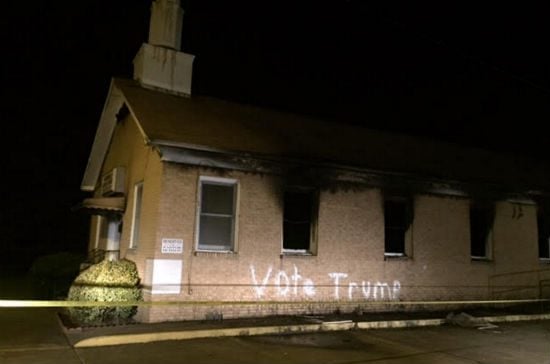“A Black Church Burned in the Name of Trump,” Emma Green reports for The Atlantic.
A black church in Greenville, Mississippi, was set on fire on Tuesday night. Fire fighters arrived to find Hopewell Missionary Baptist Church “heavily engulfed in flames,” Mayor Errick Simmons said in an interview; the fire took nearly an hour to contain. No one was in the church at the time, and no one was injured. On the side of the church, beneath the blackened windows and roof, the words “Vote Trump” have been spray painted.
Black churches have burned in America for as long as there have been black churches. Those churches stand as a symbol of black community, black lives, black capability, black strength — and so they have always been a target for those who cannot abide such things.
Black churches burned in America long before Donald Trump came along. And Donald Trump did not call for the burning of this Mississippi church. And, of course NotAllTrumpSupporters look favorably on the burning of black churches.
But as I said yesterday after the Ku Klux Klan officially endorsed Trump for president: Not all Trump supporters are Klan, but all Klan are Trump supporters.

The burning of black churches is just another symptom of the same disease that has produced a spike in violent threats and anti-Semitic hatred online. The kind of people inclined to carry out such acts enthusiastically believe that Trump’s candidacy — and Trump himself — have given them permission to do so. They believe they are breaking free of the stifling “political correctness” that Trump constantly mocks and condemns. They are providing a foretaste of what they believe will be rightly restored when a white man is back in the White House — a white man who shares their fear and contempt of anyone who is not also a white man.
Such acts of violence and intimidation are implicitly first person plural. They convey the message “We don’t want your kind.” We don’t want you to have rights, or power, or equality. We don’t want you living here. We don’t want you living at all.
When that undefined, presumed first person plural is not challenged — when it is not loudly refuted and shouted down — then acts of violence like this gain momentum and power. Their frequency and their body count begins to rise.
So a big part of preventing things like this is an emphatic, consequential rejection of this presumptuous “we.” The implicit plural of that first person plural needs to be shown to be a lie. The people committing such acts need to be forced to understand that they are not “we.” They need to be made to realize that whatever “we” they imagine they represent represents only itself — a pathetic rump faction of the disgruntled and deplorable. They need to be assured of this by everyone they meet. They need to have this proven to them by the criminal justice system.
And they need to hear it loud and clear on election day. Very loud and very clear.
A resounding defeat of their chosen champion won’t make the church-burners and the online Nazis disappear. But it will take away their growing sense that they’re acting with the blessing of a would-be president. And it will make it more difficult for them to cling to the illusion that they’re acting on behalf of some imagined “we” that includes me, and you, and the majority of the country.












